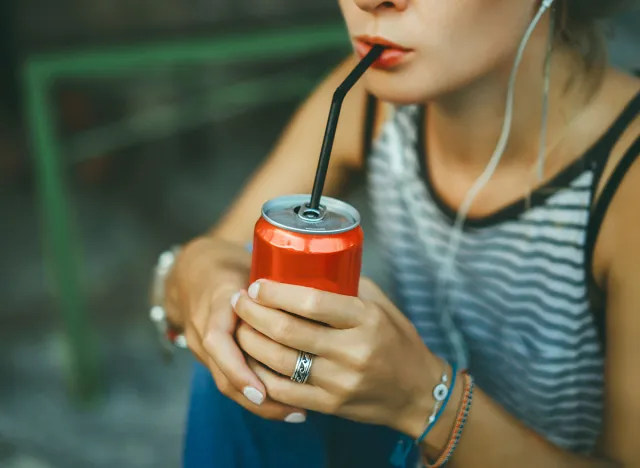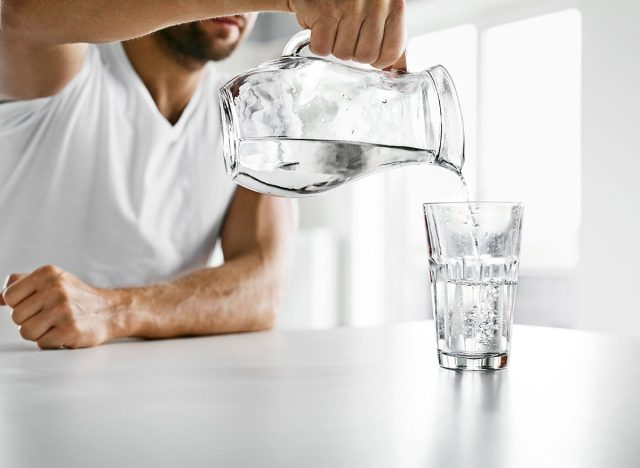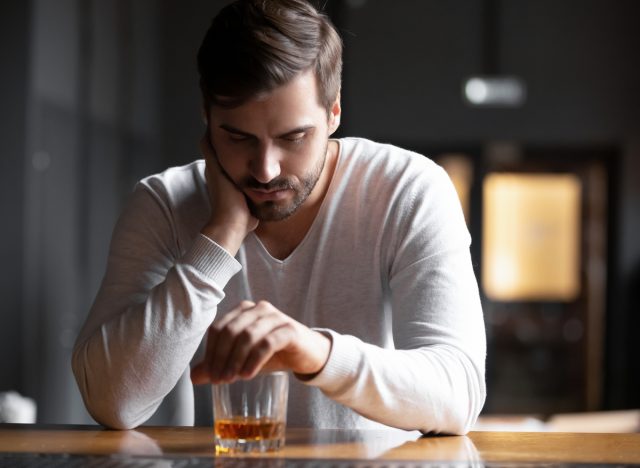We only get one brain—and anything we can do to preserve its health is an investment in our longevity. Having an agile mind that can grasp comprehension, retention, focus, and creativity will keep us feeling younger and happier. However, some drinking habits cause our noggin' to age faster than they should. From drinking too much alcohol and skipping water to choosing sugar-rich beverages, here are big no-nos for brain health.
Drinking to get intoxicated

When you're in a new social setting, alcohol is a fast way to feel more social and at ease. If you feel uncomfortable, you may have more drinks than you genuinely should, making you feel intoxicated and building up toxins that harm your brain cells, warns Dr. William Li, an author, physician, and medical director of the Angiogenesis Foundation.
"High levels of alcohol can kill brain neurons in short order, so drinking excessively to get drunk can cause brain damage," he explains.
In the short term, your brain can repair itself but repeated drinking to get drink builds up the toxic effects in the brain and causes neuroinflammation.
"This becomes obvious you're your cognitive functions are impaired, and your personality changes," he adds. "The toxic effects of alcohol will also damage your other organs, like your liver and heart."
Rather than going hard, go easy with one glass of red wine during a social gathering. This will give you the calmness you're seeking without damage to your brain.
Drinking beverages high in sugar

Although the brain needs glucose—aka, sugar—to function, too much can be a bad thing, warns Tara Tomaino, RD and the nutrition director at The Park. As she explains, many studies have linked excess sugar consumption with cognitive impairment, and it's a particular concern for people with diabetes. How come?
"As the disease can cause a restriction of blood vessels, reducing the amount of blood flow to the brain," she continues.
Giving up sugar is a difficult feat, but you can take baby steps by replacing your go-to sodas, juices, teas, and slushies with unsweetened varieties. Or, Tomaino says to dilute sweet drinks with water or gradually reduce the amount of sugar that you add on your own.
"Don't worry—your tastebuds will adjust," she adds.
Not drinking enough water

Considering your brain is made up of nearly 70% water, staying hydrated is one of the most fundamental ways to achieve wellness in your body and mind, says Serena Poon, certified nutritionist and a celebrity chef.
"Researchers have found that even mild dehydration can impact cognitive function," Poon says. "Keep in mind that beverages that contain alcohol and caffeine are diuretics, meaning they can detract from overall hydration."
A good rule of thumb is drinking your body weight in ounces each day—so if you weigh 150 pounds, aim for 150 ounces.
Drinking alcohol on an empty stomach

Wanna know something scary? Dr. Li says drinking on an empty stomach leads to the rapid absorption of alcohol in your bloodstream, and it can start building up in your brain within five to ten minutes after a sip.
"Although each person's body metabolizes alcohol at a slightly different rate, drinking with food slows down absorption in the stomach, and food also dilutes the alcohol content, so levels do not build up as quickly or at such high levels in the blood and brain for each drink," he explains.
Rather than boozing when you haven't had food in a while, pair your beverage with foods that are high in protein, fiber, and healthy fats, all of which work to slow alcohol absorption.
"Foods like oily fish contain omega3 fatty acids, which have been shown to lower inflammation in the body," he adds.
Drinking a glass or two each night

Bad news: if you enjoy coming home to Netflix and a tall glass of pinot, you could be impacting your mind and memory. According to the Nature Scientific Reports research, 353 participants underwent MRI scans showing that moderate alcohol consumption—fewer than three drinks per day for females, four drinks per day, or less for males—was associated with a smaller brain volume.
If you need to cut back, consider putting something else in a wine glass to maintain the ritual, without the negative influence, recommends Karen Raden, MS, RD, CCN, L.D.N, from Raden Wellness.
"This is a psychological approach for those drinking alcohol based on the ritual of drinking versus the need to drink," Raden says.
Drinking by yourself

While, of course, there is nothing wrong with enjoying a glass of something alone occasionally, if it's a regular habit, it could be one of the first signs of addiction and overconsumption.
"Excessive drinking that causes neurological disorders, liver disease, and a host of other physical and mental health problems. Alcohol addiction leads to premature brain aging and cognitive disorders," Dr. Li says.
Consider saving a drink for social times rather than popping open a bottle of something and downing the whole thing solo.
"Whether you are going to celebrate an event or just enjoy a drink, save it for when you are with company," he says. "You and your pals can keep an eye on each other."
Remember, if you find yourself drinking alone frequently, thinking about alcohol for much of the day, or spending time obtaining alcohol regularly, you may need to find help through a support group or a rehabilitation center.
Drinking a lot of caffeine

There's good and bad news for coffee drinkers: Poon says caffeine in moderate doses has been shown to support a healthy and alert brain—and it can even help protect your brain from aging.
However, like many things, if you overdo it, you might be damaging your brain.
"One study found that high coffee consumption, above 6 cups per day, was associated with smaller brain volume and increased risk of dementia," she continues. "If you're monitoring your caffeine consumption, make sure to count teas and chocolates as well."